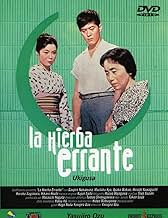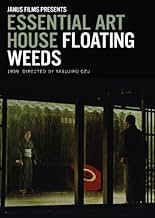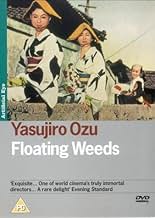AVALIAÇÃO DA IMDb
7,9/10
9,5 mil
SUA AVALIAÇÃO
Adicionar um enredo no seu idiomaThe head of a Japanese theatre troupe returns to a small coastal town where he left a son who thinks he is his uncle, and tries to make up for the lost time, but his current mistress grows j... Ler tudoThe head of a Japanese theatre troupe returns to a small coastal town where he left a son who thinks he is his uncle, and tries to make up for the lost time, but his current mistress grows jealous.The head of a Japanese theatre troupe returns to a small coastal town where he left a son who thinks he is his uncle, and tries to make up for the lost time, but his current mistress grows jealous.
- Direção
- Roteiristas
- Artistas
- Direção
- Roteiristas
- Elenco e equipe completos
- Produção, bilheteria e muito mais no IMDbPro
Avaliações em destaque
Komajuro Arashi and his acting troupe arrive in a small fishing village on the coast of Japan. Komanjuro goes to visit a woman who runs a sake bar, and who, we learn, is a former lover, and with whom he fathered a child, though the child is unaware of this fact and believes him to be his uncle
Their son, Kiyoshi, has just finished high school, and Komanju comes to see him as much as his former lover. He hopes that Kiyoshi will be able to become something in his life and not end up like Komanju himself, a washed-up actor drawing small crowds for his failing samurai productions.
When Komajuro talks with his gorgeous young son, we can see the excitement in his eyes, in his face. The acting here is all rather flat, or better, it's reserved. (Ozu adds a little joke to this later in the film, when on a fishing boat Kiyoshi accuses his father of being "too muggy" in his performance.) This adds to the impact of the few emotional (and physical) outbursts later in the film.
The conflict in the film is that of Komajuro's double lives. When his current mistress, Miss Sumiko -- a jealous and conniving witch of a woman -- discovers that he's been seeing some other woman, she's enraged, and plots what she believes will be his sort of downfall. By hiring a young woman, Kayo, to seduce Kiyoshi and embarrass Komajuro, she plans on making the two seem like different generations of the same person, both relating with unimportant actresses, thereby ruining Komajuro's hopes of his son becoming somebody important.
Unlike most, Ozu is an auteur because of what he doesn't do. His unmoving camera, which is famous, sits placidly, observing the characters with interest. I do sometimes wish that the camera would move around curiously, interested in the conversations of the characters, but maybe Ozu's point was that his camera is (or we should be) too interested to move, and that the events of everyday life need not be jazzed up for entertainment purposes. (He seems to mock this idea when he has Komajuro say to Kiyoshi about his plays that, basically, modern audiences can't appreciate good drama.) The entire film is restrained; on the rare occasion when people cry, they cover their faces and softly whimper.
The ending shot of a dark blue sky, with red lights from a rolling train, reminds us that whether it's 2003 in North America or 1959 in a small Japanese fishing village, we're all the same people with the same problems.
In and of itself, the film is terrifically simple: a simple story, with simple acting, simple music, and made even more simple by the simplicity of the static camera. But what makes the film something special, rather than just some family drama, is the honesty. Ozu isn't after anything big here. Any enlightenment comes from Ozu's realization that the most important conflicts are in the home, the ones no one sees, the ones we all feel.
****
Their son, Kiyoshi, has just finished high school, and Komanju comes to see him as much as his former lover. He hopes that Kiyoshi will be able to become something in his life and not end up like Komanju himself, a washed-up actor drawing small crowds for his failing samurai productions.
When Komajuro talks with his gorgeous young son, we can see the excitement in his eyes, in his face. The acting here is all rather flat, or better, it's reserved. (Ozu adds a little joke to this later in the film, when on a fishing boat Kiyoshi accuses his father of being "too muggy" in his performance.) This adds to the impact of the few emotional (and physical) outbursts later in the film.
The conflict in the film is that of Komajuro's double lives. When his current mistress, Miss Sumiko -- a jealous and conniving witch of a woman -- discovers that he's been seeing some other woman, she's enraged, and plots what she believes will be his sort of downfall. By hiring a young woman, Kayo, to seduce Kiyoshi and embarrass Komajuro, she plans on making the two seem like different generations of the same person, both relating with unimportant actresses, thereby ruining Komajuro's hopes of his son becoming somebody important.
Unlike most, Ozu is an auteur because of what he doesn't do. His unmoving camera, which is famous, sits placidly, observing the characters with interest. I do sometimes wish that the camera would move around curiously, interested in the conversations of the characters, but maybe Ozu's point was that his camera is (or we should be) too interested to move, and that the events of everyday life need not be jazzed up for entertainment purposes. (He seems to mock this idea when he has Komajuro say to Kiyoshi about his plays that, basically, modern audiences can't appreciate good drama.) The entire film is restrained; on the rare occasion when people cry, they cover their faces and softly whimper.
The ending shot of a dark blue sky, with red lights from a rolling train, reminds us that whether it's 2003 in North America or 1959 in a small Japanese fishing village, we're all the same people with the same problems.
In and of itself, the film is terrifically simple: a simple story, with simple acting, simple music, and made even more simple by the simplicity of the static camera. But what makes the film something special, rather than just some family drama, is the honesty. Ozu isn't after anything big here. Any enlightenment comes from Ozu's realization that the most important conflicts are in the home, the ones no one sees, the ones we all feel.
****
This close remake of Yashijuro Ozu's silent 'The Story of Floating Weeds' from 1934 which was made under the aegis of Shochiku studios is a far mellower work which reflects not only its director's maturity but also the cheerier tone preferred by Daiei. He also has the benefit here of utilising Daiei's senior lighting cameraman Kazuo Miyagawa whose colour cinematography is ravishing as well as two of Daiei's leading performers Ganjiro Nakayama and Machiko Kyo as master and mistress Komajuro and Sumiko. The sunnier treatment is heightened by the wistful, nostalgic score by Fakandu Saito which would not be out of place in a Jacques Tati film.
Taking its title from the Japanese name for itinerant actors, this has all the hallmarks of Ozu's oeuvre, in terms of serenity, humanism and a profound understanding of the human heart. As usual the camera is static and placed a little below the actors whilst the compositions are nothing less than painterly. For this viewer at any rate one would have wished a few scenes, notably the confrontation between Komajuro, Oyoshi, Kyoshi and Kayo, to have been a little more animated but that is simply not Ozu's way. The argument between Komajuro and Sumiko whilst sheltering from the rain is masterfully handled as is their final touching scene in the railway station. The splendid images that open and close the film linger long in the memory.
By all accounts Ozu never aimed for an international audience and indeed his films were not really appreciated in the West until the decade after his death. His work is very much one of variations on a theme and as avowed Ozu devoteee Roger Ebert has observed: "To look at any of his films is to glimpse the whole."
Taking its title from the Japanese name for itinerant actors, this has all the hallmarks of Ozu's oeuvre, in terms of serenity, humanism and a profound understanding of the human heart. As usual the camera is static and placed a little below the actors whilst the compositions are nothing less than painterly. For this viewer at any rate one would have wished a few scenes, notably the confrontation between Komajuro, Oyoshi, Kyoshi and Kayo, to have been a little more animated but that is simply not Ozu's way. The argument between Komajuro and Sumiko whilst sheltering from the rain is masterfully handled as is their final touching scene in the railway station. The splendid images that open and close the film linger long in the memory.
By all accounts Ozu never aimed for an international audience and indeed his films were not really appreciated in the West until the decade after his death. His work is very much one of variations on a theme and as avowed Ozu devoteee Roger Ebert has observed: "To look at any of his films is to glimpse the whole."
This, one of Ozu's last films, has all the elements of a Shakespearean tragedy played out among people living simple, workaday lives: deceit, jealousy, betrayal, vengeance, love, hope. It's all there. The acting by an all-star cast (at the time) of Japanese actors, including the gorgeous Ayako Wakao, is uniformly excellent. The cinematography may be the best I've seen for any color film made in the 1950's. The overall pace was a bit too slow for my liking, but it works well with a static camera taking every shot below eye level. This gives the viewer a visual perspective similar to looking at the actors on a slightly elevated stage, just as the audience does when watching the plays put on by the itinerant group of actors that centers the film. Overall, a well-crafted work by a recognized master, but not for the 'explosions & car chase' crowd. Rating: 8/10
... aren't we all, their lives steadily unravelling as their audience shrinks, their relationships stretched with secrets, revenge and deception coming to the fore. A poetic observation of life that turns the seemingly ordinary into something quite the opposite and, as relevant today as it has always been, as it encourages you to reflect on who you really are or have been, where you've come from and, more importantly, where you might be going.
I wrote this after I saw my first Ozu's film, "Tokyo Story" about a year ago: "As with every great work, the film has its own unique perfection in style, rhythm, details, and artist's vision - but Tokyo Story is very universal in its appeal, simply put, it is for every parent, every son or daughter - for everyone. It was made 50 years ago in Japan, about people who lived far away, but it is also about all of us, our families, our problems, our guilt and our search for love and meaning. Ozu's film does not require one to be a movie buff or to try to solve complex symbolism to appreciate and love it. It brings smiles because it is a comedy (for at least the first 2/3) and sadness with a high drama of the last 1/3 of the film."
I feel absolutely the same about "Floating Weeds". The film is quiet and deceptively simple but its simplicity reminded me the words of Michelangelo Buanorotti. When asked how he created the perfect statues from the shapeless marble lumps, he answered, "It is very simple, you just cut off all unnecessary pieces".
Ozu's films are perfect - they touch us with rare warmth, soft enveloping tenderness and power of human emotions not necessarily with striking visual or sound effects. "Floating Weeds" is a remake of earlier silent black and white Ozu's film "The Story of Floating Weeds". The story is simple: an aging, traveling actor who is the manager of a kabuki troupe returns to a remote village where he secretly meets his former lover and her 19 year old illegitimate son, to whom he is known as "uncle." The older man finds happiness in communicating with his son who turned to be a fine young man. His current mistress, filled with jealousy because of his attachment to his secret family, hires a young beautiful girl, the member of a troupe to seduce a boy. Something in this story attracted Ozu so much that he remade the film twenty five years later.
"Floating Weeds" is a beautiful color film and it is the first color Ozu's film for me. The colors are bright and fresh, tender and kind - they match the director's style perfectly. The delightful music by Kojun Saito reminds me of Nina Rota music in Fellini's films - nostalgic, innocent and rhythmic.
I feel absolutely the same about "Floating Weeds". The film is quiet and deceptively simple but its simplicity reminded me the words of Michelangelo Buanorotti. When asked how he created the perfect statues from the shapeless marble lumps, he answered, "It is very simple, you just cut off all unnecessary pieces".
Ozu's films are perfect - they touch us with rare warmth, soft enveloping tenderness and power of human emotions not necessarily with striking visual or sound effects. "Floating Weeds" is a remake of earlier silent black and white Ozu's film "The Story of Floating Weeds". The story is simple: an aging, traveling actor who is the manager of a kabuki troupe returns to a remote village where he secretly meets his former lover and her 19 year old illegitimate son, to whom he is known as "uncle." The older man finds happiness in communicating with his son who turned to be a fine young man. His current mistress, filled with jealousy because of his attachment to his secret family, hires a young beautiful girl, the member of a troupe to seduce a boy. Something in this story attracted Ozu so much that he remade the film twenty five years later.
"Floating Weeds" is a beautiful color film and it is the first color Ozu's film for me. The colors are bright and fresh, tender and kind - they match the director's style perfectly. The delightful music by Kojun Saito reminds me of Nina Rota music in Fellini's films - nostalgic, innocent and rhythmic.
Você sabia?
- CuriosidadesStated by cinematographer Kazuo Miyagawa about director Yasujirô Ozu: "I'll never forget that, from the first day on, he knew the names of everybody on the set, fifty people in the crew, people he'd never worked with. He'd written their names down, I learned later. But everyone was impressed and became devoted to him. Every single day working on this film was extremely pleasurable and enriching. In each of Ozu's films you can sniff his personality. He was pure, gentle, light-hearted, a fine individual."
- Erros de gravaçãoNear the end, sandals disappear or move around: after Kiyoshi argues with his father, he runs upstairs, first slipping out of his sandals and leaving them at the bottom (center) of the stairs. Moments later, Kayo goes up to him. We see that she, too, removes her sandals at the bottom of the stairs. But Kiyoshi's sandals have now suddenly disappeared: we see only Kayo's sandals at the bottom of the stairs. Moments later, Kiyoshi comes back downstairs to go after his father. He goes to put on his sandals, which have now suddenly reappeared, but in a different location from where he took them off. A moment later, Kayo also comes down the stairs and puts on her sandals, which are approximately where she had removed them and placed them, moments earlier.
- Citações
Komajuro Arashi: You can't help an empty house, when it's empty.
- ConexõesFeatured in Siskel & Ebert Holiday Gift Guide (1989)
- Trilhas sonorasWasurecha iyayo (aka: Don't forget me)
Composed by Yoshikatsu Hoshoda
Sang by the play troupe on a ship
Principais escolhas
Faça login para avaliar e ver a lista de recomendações personalizadas
- How long is Floating Weeds?Fornecido pela Alexa
Detalhes
- Tempo de duração1 hora 59 minutos
- Proporção
- 1.37 : 1
Contribua para esta página
Sugerir uma alteração ou adicionar conteúdo ausente



































